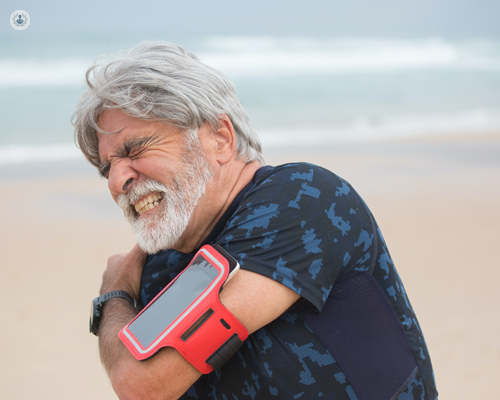How are rotator cuff injuries best treated?
Written in association with:In this article below, highly regarded consultant trauma and orthopaedic surgeon, Mr Ben Caesar, explains in detail what a rotator cuff injury is, and outlines the various associated symptoms.

What is the rotator cuff, and what parts of the body does it affect?
Rotator cuff injuries are a common cause of shoulder pain and disability. The rotator cuff is a group of muscles and tendons that surround the shoulder joint, keeping the head of the upper arm bone firmly within the shallow socket of the shoulder.
What are the symptoms of a rotator cuff injury?
A rotator cuff injury can cause a dull ache in the shoulder that worsens at night. Pain when lifting the arm, which makes it difficult to perform some daily activities like combing hair, pain that disturbs sleep when lying on the affected side, and pain accompanied by weakness in the arm are some of the other main symptoms of a rotator cuff injury.
How important is the rotator cuff?
The rotator cuff is essential for shoulder movement and stability. It helps to lift and rotate the arm and stabilise the ball-and-socket joint of the shoulder.
What causes rotator cuff injuries?
Rotator cuff injuries can occur due to repetitive overhead motions or sudden trauma. Athletes who participate in sports that require repetitive overhead motions, such as baseball, tennis, and swimming, are at risk of developing rotator cuff injuries.
What are the different types of rotator cuff injuries?
There are many different types of rotator cuff injuries. They are tendinitis, bursitis, partial tears, and complete tears.
How are rotator cuff injuries best treated?
Treatment for rotator cuff injuries depends on the severity of the injury. Rest, ice, and physical therapy can help relieve pain and improve range of motion in mild cases. In more severe cases, surgery may be necessary to repair or reattach torn tendons.
When should people seek medical attention for rotator cuff injuries?
If you experience symptoms of a rotator cuff injury, such as shoulder pain or weakness, it’s essential to seek medical attention promptly.
To schedule in an appointment today with Mr Ben Caesar, simply visit his Top Doctors profile.


